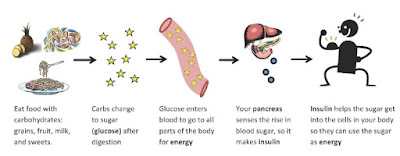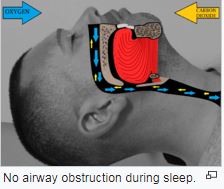Understanding Diabetes for a better treatment
Diabetes - Too much sweetness is, injurious to health!
What is Diabetes?
Before discovering Diabetes, lets first understand blood glucose(Sugar)and Insulin.
Glucose is a type of sugar that the human body gets from foods intake, and it is used by the body for energy. It travels through the bloodstream to the cells, therefore is called blood glucose or blood sugar. Glucose act as a source of energy for the cells that make up muscles and tissues. It is also the main source of fuel for the brain.
There is an organ located behind the stomach called the pancreas. There are areas within pancreas called islets of Langerhans which are made up of cells called beta cells. Beta cells are responsible for the production of a hormone called Insulin.
Insulin is released from the pancreas into the bloodstream to reach different parts of the body. Insulin controls the use of carbohydrates (found in certain types of food) in the body. Carbohydrates are broken down by the human body to produce glucose. With the help of Insulin, cells in the muscles, liver and fat (adipose tissue) take up this glucose and use it as a source of energy required for their proper functionality. Extra glucose that is not used by the cells is converted and stored as fat so that it can be used to provide energy when glucose levels are low.
Now, any kind of malfunctioning due to which pancreas produces very little or no insulin, or when the body does not respond appropriately to insulin gives birth to diseases called DIABETES.
As said earlier some people don’t make any insulin at all while other people make too little insulin or don’t use that insulin efficiently. Therefore, diabetes is broken down into different types, with the most common forms being type 1 and type 2 diabetes. Some women also get diabetes when they become pregnant; this is called gestational diabetes.
Genetic defects, diseases such as cystic fibrosis, organ transplantation, or AIDS treatment also could lead to some other types of Diabetes. In fact, there are more than ten different forms of diabetes!
As said earlier some people don’t make any insulin at all while other people make too little insulin or don’t use that insulin efficiently. Therefore, diabetes is broken down into different types, with the most common forms being type 1 and type 2 diabetes. Some women also get diabetes when they become pregnant; this is called gestational diabetes.
Genetic defects, diseases such as cystic fibrosis, organ transplantation, or AIDS treatment also could lead to some other types of Diabetes. In fact, there are more than ten different forms of diabetes!
Types of Diabetes
Type 1 diabetes - When our immune system destroys beta cells (cells in our pancreas), production of insulin is stopped and Type 1 diabetes happens.
In around, 50 per cent of people with type 1 diabetes, the disease is diagnosed during childhood or their early teen years. Type 1 diabetes is the second most common chronic disease in children after asthma. Type 1 diabetes can occur at any age. About 5% of adults with diabetes have type 1 diabetes.
People suffering from type 1 diabetes make very little or no insulin, which means that the symptoms of diabetes are often serious and swift. Without insulin, the cells in our body are unable to perform their essential function. Most people with type 1 diabetes will feel quite sick and may even be rushed to the hospital due to high blood glucose.
People suffering from type 1 diabetes make very little or no insulin, which means that the symptoms of diabetes are often serious and swift. Without insulin, the cells in our body are unable to perform their essential function. Most people with type 1 diabetes will feel quite sick and may even be rushed to the hospital due to high blood glucose.
- Frequent urination - The body tries to flush out excess glucose in the blood
- Extreme thirst
- Fatigue because the necessary glucose is not getting into the cells
- Blurred vision because of a buildup of fluid in the eyes or elevated glucose levels
- Weight loss
- Nausea and vomiting
- Fast heart rate, frequent infections, headache, sleepiness are also common symptoms
A Different Type 1 Diabetes
Some people with type 1 diabetes may have a slow and relentless
progression of symptoms. In fact, they may not need to start insulin right
away. This condition is called latent autoimmune diabetes of the adult(LADA). As its name suggests, it occurs in adults. Scientists are still trying
to explore the disorder to improve diagnosis and treatment of people
with LADA.
progression of symptoms. In fact, they may not need to start insulin right
away. This condition is called latent autoimmune diabetes of the adult(LADA). As its name suggests, it occurs in adults. Scientists are still trying
to explore the disorder to improve diagnosis and treatment of people
with LADA.
Frequently asked questions
Is diabetes Type 1 dangerous?
Over time, complications due to type 1 diabetes can affect major organs in our body which may include heart, blood vessels, nerves, eyes and kidneys. Maintaining a normal blood sugar level can dramatically reduce the risk of many complications. Otherwise, uncontrolled blood sugar levels for the long term may be disabling or even life-threatening.
Who has diabetes type 1?
Anyone can have type 1 diabetes. Previously, it was believed to be more common in children known (as juvenile diabetes), however, there are more adults who have type 1 diabetes than children.
What happens if you don't treat Type 1 diabetes?
It can lead to serious complications like kidney failure and heart disease, poor blood circulation and nerve damage.
Is Type 1 diabetes curable?
There is no cure for diabetes.
Can Type 1 diabetic patient fast?
People with type 1 diabetes are not advised to fast this is because fasting while taking insulin can increase the risk of hypoglycemia.
To be continued.






Comments
Post a Comment
Please comment